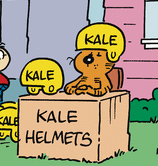|
You're all roasting this poor guy for trying to talk about phonetics, but I just want to know what "subdrama" is. Google tells me it's a Reddit thing?
|
|
|
|

|
| # ? Apr 16, 2024 11:25 |
|
I don't know what I'm talking about, sorry.
|
|
|
|
The sentence does contain the phonemes you're referring to but whatever that's exceptional or not is another question
|
|
|
|
no need to apologise! I'm curious what you wanted to highlight though, mind pointing it out "manually" (i.e. "the cadence that comes from the use of plosives in 'abandoned railway spur into'" or whatever (not a particularly good example) - just highlight the letters)? don't feel pressured if you'd rather not, of course
Lex Neville fucked around with this message at 18:23 on Jan 29, 2019 |
|
|
|
also sorry Mel but thisMel Mudkiper posted:yeah I teach phonetics and that is gibberish was pretty funny
|
|
|
|
Lex Neville posted:/ɪə/ is two syllables in this instance. Doesn't that depend on your accent? I say "air-ee-al"; but other people pronounce it more like "air-yal".
|
|
|
|
In that case, it's a yod (/j/) which isn't a vowel sound, so once again not a diphthong. e: it's a little less clear-cut than that, because /j/ is a glide and gliding is the main characteristic of diphthongs, so sometimes "you" (/ju:/) is considered a diphthong, but generally speaking the yod, while semivocalic, is considered a voiced palatal approximant and not a vowel sound because it doesn't function as the nucleus of a syllable like a vowel sound (or syllabic consonant) can. Lex Neville fucked around with this message at 14:54 on Jan 30, 2019 |
|
|
|
Once again I'm reminded of just how little I know about phonetics. But thanks for the informative response!
|
|
|
|
hi, have some Kelman: In this factory in the north of England acid was essential. It was contained in large vats. Gangways were laid above them. Before these gangways were completely safe a young man fell into a vat feet first. His screams of agony were heard all over the department. Except for one old fellow the large body of men was so horrified that for a time not one of them could move. In an instant this old fellow who was also the young man’s father had clambered up and along the gangway carrying a big pole. Sorry Hughie, he said. And then he ducked the young man below the surface. Obviously the old fellow had had to do this because only the head and shoulders – in fact, that which had been seen above the acid – was all that remained of the young man.
|
|
|
|
You go first
|
|
|
|
Lex Neville posted:You go first k. James Kelman posted:In this factory in the north of England acid was essential. It was contained in large vats. Gangways were laid above them. So Kelman instantly establishes the setting and scenario. The first sentence immediately establishes that the workers in this factory are working class labourers ('north of England') who deal with toxic acid every day to run their operations. By mentioning the vats and gangways, we immediately think, aw, gently caress, something'll go horribly- James Kelman posted:Before these gangways were completely safe a young man fell into a vat feet first. His screams of agony were heard all over the department. Except for one old fellow the large body of men was so horrified that for a time not one of them could move. -wrong. Kelman doesn't waste a word. He gives the essential details, and then he shocks us right away by describing the accident and the worker's screams, but not without hooking us further with the 'one old fellow'. James Kelman posted:In an instant this old fellow who was also the young man's father had clambered up and along the gangway carrying a big pole. Sorry Hughie, he said. And then he ducked the young man below the surface. So this entire section is loving depressing and amazing simultaneously. Death by acid is such a commonplace occurrence that the old fellow doesn't even flinch when someone dies, especially not when his own son dies. He just follows procedure, like he's just a cog in the machine. 'Sorry Hughie' is so devoid of emotion, it's like he's saying 'idgaf, I'm just doing my job'. The factory is so loving dehumanising that a father can remorselessly duck his son into a vat of acid and pass it off as something normal. Just to twist the knife: James Kelman posted:Obviously the old fellow had had to do this because only the head and shoulders – in fact, that which had been seen above the acid – was all that remained of the young man. Kelman isn't saying that the old fellow had to do this because he was Hughie's father or anything like that - he just had to do it to keep the factory going. It's that sort of hosed up notion of productivity at any costs that fuels capitalism at the cost of peoples' emotions and even lives. Granted, there's an element of positive change because the gangways eventually became 'completely safe', but it came at the cost of lives like Hughie's, and doubtless many more before him if the old fellow was able to move up in an instant to dunk his son. So yeah. Read more Kelman.
|
|
|
|
You're explaining what is there, not why it's good. Mind you, I don't think it's bad (quite the contrary, actually), but I also wouldn't wax lyrical simply because it's succinct. It's good, it does a lot within 150 words. Its brevity in style enhances its brevity in form. At the same time, though, the latter demands the former; if this story were three times as long (even only three times), its style would have worn you out long before you reached the 400th word, while, simultaneously, if he'd employed a style that took three times as many words to say the same, it wouldn't have been anything special. That synergy makes it work, but in a way it's restricting too. It's good. It's carefully crafted. It's baby shoes. It's a bit of a gimmick. Couple of things, though: Kelman posted:Except for one old fellow the large body of men was so horrified that for a time not one of them could move. You posted:Death by acid is such a commonplace occurrence that the old fellow doesn't even flinch You posted:especially not when his own son dies You posted:he just had to do it to keep the factory going
|
|
|
|
I read it as the old man ducking Hughie under to cut short his misery, but I suppose he wouldn't be able to scream without lungs
|
|
|
|
Lex has got it right, I think. Not knowing what comes next, it seems pretty clear to me that Hughie's father "had had to do this" because obliterating the body was preferable to retrieving only a mutilated head. That said, the situation presented seems a little contrived. I can't imagine open vats of acid (much less acid strong enough to dissolve a body in seconds) have ever been as common as Kelman and DC Comics would have us believe. Practically any other industrial accident would have denied Kelman his absurdly poignant moment. But we're here to talk prose. Phrases like "had had to do this" and misplaced details like "who was also the young man's father" are clever naturalistic touches, imo—but there's a fine line between naturalistic and clumsy, and the last sentence definitely crosses it.
|
|
|
|
All books are bad, writing is bad, all stories should be communicated via interpretative dance (USER WAS PUT ON PROBATION FOR THIS POST)
|
|
|
|
Eugene V. Dubstep posted:there's a fine line between naturalistic and clumsy, and the last sentence definitely crosses it. That final sentence would've been so much better without what is between the dashes  (though obviously "only the head and shoulders was all that" already begs for rephrasing as it stands) (though obviously "only the head and shoulders was all that" already begs for rephrasing as it stands)
|
|
|
|
Eugene V. Dubstep posted:Lex has got it right, I think. Not knowing what comes next, it seems pretty clear to me that Hughie's father "had had to do this" because obliterating the body was preferable to retrieving only a mutilated head. That said, the situation presented seems a little contrived. I can't imagine open vats of acid (much less acid strong enough to dissolve a body in seconds) have ever been as common as Kelman and DC Comics would have us believe. Practically any other industrial accident would have denied Kelman his absurdly poignant moment. i dont see it as contrived.. never underestimate the utter lack of regard for safety or humanity that factory owners have displayed throughout history. locking doors to sweatshops, taking out life insurance on the women who handle your radioactive material, etc, etc, etc, i liked the snippet, its got impact, and as you say it feels naturalistic/"real". i dont like the m-dashes though. they break the spell, id prefer parentheses i think. e: omg, i didnt see your post before i wrote this, Lex Neville Carthag Tuek fucked around with this message at 00:23 on Feb 10, 2019 |
|
|
|
^^^ that's cool! I do agree that it isn't necessarily contrived. I can suspend scepticism in that regard for the sake of it being a gimmick, but I don't see the point of the "in fact" bit. Would you prefer parentheses over omission?
Lex Neville fucked around with this message at 00:31 on Feb 10, 2019 |
|
|
|
Lex Neville posted:^^^ that's cool! honestly, youre right. omission is better. its too nerdily technical and ruins the flow imo
|
|
|
|
Krankenstyle posted:i dont see it as contrived.. never underestimate the utter lack of regard for safety or humanity that factory owners have displayed throughout history. locking doors to sweatshops, taking out life insurance on the women who handle your radioactive material, etc, etc, etc, I'm not saying "Heavens! Surely no one would display such a flagrant disregard for worker safety!" I'm saying: 1. Open vats of corrosive acid seem not just dangerous but impractical. 2. They're such a comic book/action movie cliché that their inclusion invites skepticism. 3. The author doesn't even identify the acid. e: To elaborate on my problem w/ the last sentence: the em dashes and the "that which had been seen above the acid" both break from the pub-story register of the rest of the paragraph, and the whole reason we've had this argument over why the old fellow dunked the head is that the clause following "because" does not actually give a reason. e2: I looked this up and apparently the paragraph that was posted is the entire story. So my nitpicks about the acid really don't matter. It's just a shocking story whose narrator may be exaggerating (see: pub stories generally). But a botched sentence is all the more egregious in a ~150 word work. Eugene V. Dubstep fucked around with this message at 00:54 on Feb 10, 2019 |
|
|
|
Wait, I'm dumb.
Sham bam bamina! fucked around with this message at 00:57 on Feb 10, 2019 |
|
|
|
Eugene V. Dubstep posted:and the whole reason we've had this argument over why the old fellow dunked the head is that the clause following "because" does not actually give a reason. I suspect that's intentional. The reader is supposed to be left hanging. It doesn't work, though, because the final sentence is too long and clumsy for the ending to be abrupt. Eugene V. Dubstep posted:e2: I looked this up and apparently the paragraph that was posted is the entire story. I'm sorry, but this realization made me laugh  Anyway, I enjoy whenever this thread is alive so I'll chime in with another fragment. Earlier tonight, I went through a couple of translation exercises I did a few years ago and here's one I remember fondly. It isn't very intricate - not much more than a playful exercise with musicality and metaphor, really - but it resonates (heh) with me. That might just be because it was so much fun to translate, so I'm curious what you guys think; it's the opening to the book, would you read on from here? Jon McGregor's If Nobody Speaks of Remarkable Things posted:If you listen, you can hear it. What follows is a similar yet inverse description of said silence. I didn't include it because I felt this was long enough, but you can either find it on google books or I can post it here if there's interest. Lex Neville fucked around with this message at 02:03 on Feb 10, 2019 |
|
|
|
is that the original formatting? i mean, is there a carriage return after almost every period or did you split it up for your translation? i like it. its evocative and picturesque without being overly sentimental. i think its probably too long for me, but its hard to say in isolation. probably works well with the silent counterpoint also i generally like when the narrator gets very specific about a sensation. Carthag Tuek fucked around with this message at 01:18 on Feb 10, 2019 |
|
|
|
No, it's like that. I copied it from a Word-document that was either copied by hand or from somewhere else. There are a few ambiguous full stops (that is to say: where it's unclear whether the line was cut off or not, i.e. the last sentence of paragraph 1 - I'll post a picture), but it's mostly if not entirely correct. The forums make it look more disjointed, imo, as lines run on forever. Here's a picture: Krankenstyle posted:i think its probably too long for me You mean this excerpt going on for too long? Because the entire novel isn't like this!
|
|
|
|
gotcha re lines re long or not: idk i just started to get antsy while reading it like i wanted it to be over. like when you know something horrible is going to happen in a story. its building without release. no idea if that is in the text or i was prejudiced from the earlier text or a third reason. i guess it builds to the silence chapter, which in that case works for me because it gives the release i want maybe?
|
|
|
|
here's what follows. the silence bit lasts for about three pages as well and is followed by something else entirely I understand the antsy bit. I don't personally get that, but I do agree it shouldn't have gone on for much longer.
|
|
|
|
yea imo the silence counterpoint raises it up 
|
|
|
|
Was it a silence in three parts?
|
|
|
|
could you not?
|
|
|
|
If you listen, you can hear it. The forum, it sings.
|
|
|
|
post more good/bad prose friends! I wish this thread was more active
|
|
|
|

|
|
|
|
"Keeler typically padded the length of his novels with the following device: his protagonist would find a magazine or book, would open it randomly and discover a story. At this point, Keeler's novel would stop dead in its tracks and he would insert the complete verbatim text of one of his wife's short stories, this being the story his novel's protagonist was reading. At the end of the story, the novel would continue where it left off, several pages nearer to its contractual minimum word count." This man is my hero.
|
|
|
|
accidental post
|
|
|
|
"Assassins are evil in alignment (perforce, as the killing of humans and other intelligent life forms for the purpose of profit is basically held to be the antithesis of weal)." -Gary Gygax It's amazing, almost every word is the wrong word to express what he wants to express. It's both overly technical AND purple at the same time, Tbf you can argue that as a passage from a rulebook for a game, this is technical writing, but it's bad technical writing too and I don't know of a thread for that.
|
|
|
|
The Vosgian Beast posted:"Assassins are evil in alignment (perforce, as the killing of humans and other intelligent life forms for the purpose of profit is basically held to be the antithesis of weal)." -Gary Gygax I'm not going to claim that this is good prose, but I don't see which words are not expressing what Gygax wants to say here, namely that killing people for money is the opposite of wellness* and therefore assassins must be evil. *Probably the word used closest to incorrectly.
|
|
|
ulmont posted:I'm not going to claim that this is good prose, but I don't see which words are not expressing what Gygax wants to say here, namely that killing people for money is the opposite of wellness* and therefore assassins must be evil. The misuse of "weal" is pretty amazing, yeah, but also you've got the tension between the absurd pretention of "perforce" and "antithesis" (instead of "necessarily" and "opposite") undercut by the valley-girl vapidity of the "basically". "Assassins kill people for money and are therefore of evil alignment."
|
|
|
|
|
Basically he’s using Vance as an example but without any of the whimsy or skill, so it just ends up being a bunch of extra words used in lovely ways
|
|
|
|
"Hortense Calisher – [u posted:Standard Dreaming[/u], 36-7"]That was a week he had gone up to Boston on the sinking arrow of premonition, not even trying the telephone. To visit his still-beloved saint. Who was blessedly still there. Who, being as he was, didn't throw his father down the stairs to the idlers watching Berners' try from below, or repudiate him in any of the ways Berners had learned from the group and its occasional visitors. Who had been content to stand there glowing from it, with the luminous skin of the fasting, receding from his father cell by cell. That cellular rejection, Berners could feel it! Of him the father, and through him, life. Which rejection had begun first, one would have to pry out as one would from a foreign organ grafted on a hopeful, intolerant body. Ask, Berners found himself pleading, to that rotunda, nameless as yet, which had already begun to attend him. Ask the cell its knowledge. Cells think.
|
|
|
|

|
| # ? Apr 16, 2024 11:25 |
|
From Alan Moore's Jerusalem.
|
|
|


























